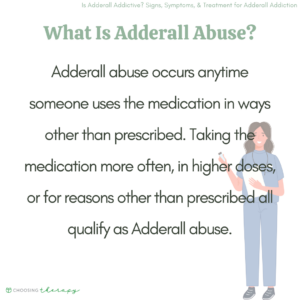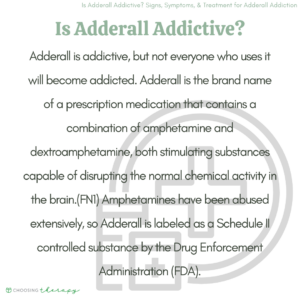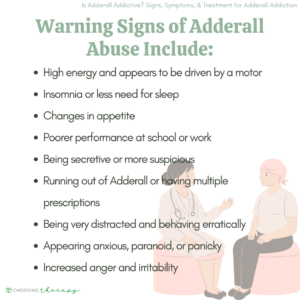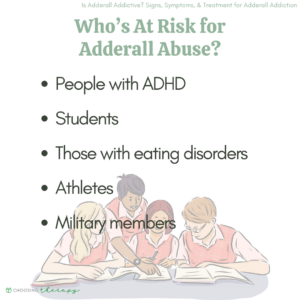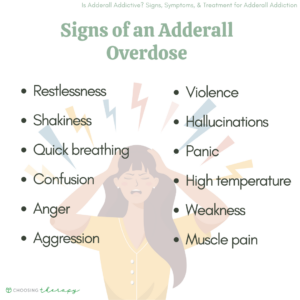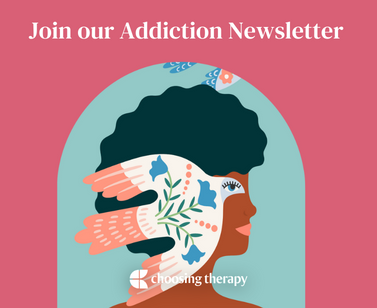Adderall is a very effective medication most commonly used to treat attention-deficit/ hyperactivity disorder (ADHD). It usually is safe as a prescription stimulant drug, but Adderall addiction is possible. This controlled substance can be used to produce a range of results, which may lead to tolerance, addiction, and physical dependence. Recognizing the warning signs can help avoid and treat Adderall addiction.
Bicycle Health: Telehealth Treatment For Opioid Use Disorder “Best For Online MAT Program For Opioid Use Disorder” (Choosing Therapy)* Bicycle Health offers therapy, support, and medication for addiction treatment (MAT). MAT offers the lowest relapse rates for opioid use disorder, helping people to stop using opioids with minimal physical discomfort. Covered by most major insurance. Visit Bicycle Health.
Is Adderall Addictive?
Adderall is addictive, but not everyone who uses it will become addicted. Adderall is the brand name of a prescription medication that contains a combination of amphetamine and dextroamphetamine, both stimulating substances capable of disrupting the normal chemical activity in the brain.1 Amphetamines have been abused extensively, so Adderall is labeled as a Schedule II controlled substance by the Drug Enforcement Administration (FDA).1
Like with other stimulants, professionals and patients must balance the helpful aspects of Adderall with the risks of addiction, tolerance, and dependence. Stimulant substances are prescribed for a variety of reasons, including:2
- Attention-deficit/ hyperactivity disorder (ADHD)
- Narcolepsy
- Depression
Anyone taking Adderall is at risk of developing an addiction, even if they use the medication as prescribed by a medical professional.
Adderall Effects & Abuse
When used as prescribed, Adderall is very effective in treating the unwanted symptoms of ADHD, including poor attention, hyperactivity, forgetfulness, and restlessness. Due to the chemical makeup of Adderall, the effects of the medication happen rapidly, rather than needing days or weeks to build up in the body like other mental health drugs.1
Someone using Adderall may experience the intended effects, including:2,3
- Alleviate depression symptoms
- Increased alertness
- Improved focus and attention
- Higher energy levels
- Decreased appetite
Adderall use may also produce several unwanted effects, including:2,3
- Higher blood pressure
- High heart rate
- Quicker breathing
- Decreased blood flow
- Higher body temperature
- Heart problems
- Seizures
Adderall abuse occurs anytime someone uses the medication in ways other than prescribed. Taking the medication more often, in higher doses, or for reasons other than prescribed all qualify as Adderall abuse.3
Especially when someone is prescribed the medication, identifying Adderall abuse is challenging. Warning signs of Adderall abuse include:4
- High energy and appears to be driven by a motor
- Insomnia or less need for sleep
- Changes in appetite
- Poorer performance at school or work
- Being secretive or more suspicious
- Running out of Adderall or having multiple prescriptions
- Being very distracted and behaving erratically
- Appearing anxious, paranoid, or panicky
- Increased anger and irritability
Who’s At Risk for Adderall Abuse?
Anyone who takes Adderall will find themselves at some risk for Adderall abuse. Those who follow recommendations and use the medication as prescribed will have a much lower risk than those who don’t take the medication exactly as prescribed.3 In most cases, it is impossible to predict whose Adderall use will result in Adderall addiction.
Those at higher risk for Adderall abuse include:2
- People with ADHD: Since people with ADHD will use more Adderall, they will experience higher risks. They could take more medication to relieve symptoms, which may end addiction.
- Students: High school and college students interested in paying attention in class, studying for an extended period, or performing well on an exam could abuse Adderall as a “cognitive enhancer.”
- Those with eating disorders: Someone with an eating disorder may be more likely to abuse Adderall to reduce appetite. Additionally, they could take medication to increase energy during an intense exercise period.
- Athletes: In sports like baseball, football, and track and field, Adderall could be considered a performance-enhancing drug. It can improve focus, attention, speed, and reaction time.
- Military members: Military branches have used stimulant medications to combat fatigue and maintain focus. This pattern could create a higher risk of addiction.
Help For Addiction Ria Health: Effective, Evidence-Based Alcohol Treatment 100% Online Quickly change your relationship to alcohol with our at-home program. On average, Ria Health members reduce their BAC levels by 50% in 3 months in the program. Services are covered by many major health plans. Visit Ria Health Workit Health – Online Treatment for Opioids or Alcohol, Including Medication. Modern, personalized recovery that combines medication, a supportive community, and helpful content. Covered by many insurance plans. Currently available in FL, TX, OH, MI, and NJ. Visit Workit Health Best Drug Addiction Rehab Centers – Find the best local detox or drug rehab center covered by your health insurance. Search by location, condition, insurance, and more. Read reviews. Start Your Search
Adderall Dependence Vs. Adderall Addiction
With substance use issues, it is essential to distinguish between dependence and addiction. The first is a physical reaction to using a substance over a period of time, while the second is defined as thought and behavioral changes that center around getting and using the substance. Someone can be addicted but not dependent or dependent but not addicted, but the two overlap greatly.2
Dependence occurs when the body and brain become so used to the presence of the drug in the system that the drug is needed to maintain balance and stability. Tolerance, the need to take more of the drug to produce the same effect, is linked to dependence. Increased doses increase the risk of dependence and addiction.2
What Causes Adderall Addiction?
An addiction to a substance may develop quickly and obviously or slowly and subtly. Various factors cause Adderall addiction, so two people who use Adderall the same way could have very different experiences.
Developing a substance use disorder is a negative outcome that should be avoided. Using Adderall as prescribed will lower the risk of addiction. Anytime Adderall is abused, there is a higher risk of addiction. No one should try to self-medicate with Adderall.
Symptoms of Adderall Addiction
Rather than looking for symptoms of Adderall addiction, many substance use and mental health professionals assess for symptoms of stimulant use disorder. This diagnosable mental health condition includes signs of addiction, dependence, and tolerance. There are many diagnostic criteria for a stimulant use disorder, but a person only needs to show two to receive the diagnosis.5
Symptoms of an Adderall addiction include:
- Taking the drug more often or in larger doses than intended
- A desire to or unsuccessful attempts to stop the use
- Spending a lot of time getting, using, and recovering from Adderall use
- Strong urges to use Adderall
- Struggling to complete responsibilities at home, work, or school
- Still using despite a negative impact on physical, mental, or social health
- Shifting priorities, interests, and relationships
- Needing more Adderall to produce the previous effect
- Feeling ill or uncomfortable when no Adderall is available
Adderall Withdrawal Symptoms
The final point from above is called Adderall withdrawal, and this is a clear sign of Adderall dependence. As the drug leaves the body, the system is no longer in balance, so that the person will experience a range of unwanted symptoms associated with stimulant withdrawal.
Rather than feeling high energy and a “rush,” someone with Adderall withdrawal will experience a “crash.”
Symptoms of Adderall withdrawal may include5,6
- Agitation
- Aggression
- Irritability
- Low mood
- Low energy
- Little interest in usual activities
- Poor self-esteem
- Increased need for sleep
- Higher appetite
- Aches and pains
- Inability to feel pleasure
- Strong cravings for Adderall
- Desire to restart substance use
Some symptoms may only last for a few days, while some depressive effects can last for several weeks after the last use.7
Can You Overdose on Adderall?
You can overdose on Adderall. Anyone can overdose on Adderall, but the people at greatest risk are those using the drug for the first time or those changing the route of administration by snorting the substance.3
Signs of an Adderall overdose include:3
- Restlessness
- Shakiness
- Quick breathing
- Confusion
- Anger
- Aggression
- Violence
- Hallucinations
- Panic
- High body temperature
- Weakness
- Muscle pain
Adderall overdose can be dangerous. Immediate medical attention is necessary.
Drugs Commonly Used with Adderall
People using Adderall may combine this substance with alcohol or other drugs to enhance, change, or relieve the effects of Adderall. For example, people mix stimulants with marijuana and alcohol in an attempt to balance the effects of the stimulant. Similarly, people may combine Adderall with Xanax, heroin, other other sedatives.7
In other settings, people may combine stimulants, like Adderall, with medications for erectile dysfunction.7 People may misuse Adderall and caffeine together to help stay alert while studying.
Bicycle Health: Telehealth Treatment For Opioid Use Disorder Medically Assisted Treatment For Addiction (MAT) Same Day Prescriptions Often Available 100% Online Covered By Most Major Insurance
Treating Adderall Addiction
Adderall addiction is a serious concern that can result in physical and mental health effects, and it can sometimes be treated before life-threatening effects occur. Like with other substance use disorders, Adderall addiction often requires a long period of time for best results.8
Treating an Adderall addiction typically involves several steps:
Step 1: Undergo a Substance Abuse Evaluation
A thorough substance use evaluation completed by a mental health professional is the best first step. During this process, the clinician will gather information about the person’s experience with substances, mental health, and physical health needs.8
The criteria for an Adderall addiction diagnosis include:5
- Taking Adderall in ways other than prescribed
- Having strong impulses to use Adderall
- Feeling sick without Adderall
- Taking larger amounts of the drug over time
- Still using despite legal, social, or occupational issues
- Still use even though it impacts physical or mental health
- Having conflicts about drug use
- Using a lot of time to get and use Adderall
Step 2: Taper or Detox From Adderall
The evaluation will determine the best course of treatment for Adderall addiction. In rare situations, a person may need a period of medical detoxification for their Adderall use. Detox is often required when the person is violent, aggressive, or psychotic due to their use, among other indications.6
Detox usually involves some level of observation and monitoring of symptoms.6
An inpatient/ residential or outpatient rehabilitation will be the recommended treatment option in some cases. During rehab, the provider will supervise stopping use or slowly tapering the dose of Adderall.6
Step 3: Manage Post-Acute Withdrawal Symptoms (PAWS)
Post-acute withdrawal symptoms (PAWS) are symptoms that continue after the initial phase of withdrawal and detoxification. These symptoms are unwanted and sometimes they increase the risk of relapse.
Some symptoms linked to PAWS of Adderall use include:7
- Depression and low mood
- Lack of energy
- Lack of pleasure in self, others, or activities
Assessing and identifying PAWS will be crucial for effective Adderall use treatment.
Step 4: Work With a Therapist for Adderall Addiction
People frequently deal with the psychological effects of addiction long after the physical effects end. For this reason, counseling will be an essential part of most treatment plans for Adderall addiction.
The benefits of therapy are many. Not only can it help reduce the risk of relapse, it can help uncover the motivations of substance use and improve overall well-being. In-person and online therapy options are readily available, affordable, and flexible enough to fit your lifestyle.
Therapy methods that can be an effective treatment in managing addictive tendencies include:8
- Cognitive behavioral therapy (CBT): CBT for addiction focuses on a person’s thoughts, feelings, and behaviors.
- Dialectical behavior therapy (DBT): By incorporating principles of CBT, DBT adds mindfulness, communication, distress tolerance, and emotional regulation.
- Motivational interviewing (MI): Motivational interviewing helps people unlock their motivation for change and outlines a path toward recovery.
- Contingency management (CM): CM offers tangible rewards and prizes to people after they accomplish recovery-focused behaviors. Attending therapy, a recovery meeting and a clean urine screening can all result in reinforcement.
- The Matrix Model: The Matrix Model is one of the best treatments for stimulant use. As a specially-designed approach, The Matrix Model incorporates education, therapy, support groups, and drug testing into one comprehensive treatment approach.
- Family-Based Therapies: Addictions frequently arise from issues within the family, so any family system therapy approach can help correct and repair the problems that may contribute to substance use.
Step 5: Develop a Relapse Prevention Plan
A relapse prevention plan is a needed component of substance use treatment. These plans help to identify issues that create urges and cravings while offering tools to use in the aftermath. Exploring plan options with the therapist is a great way to stay sober. Be sure to revisit and adjust the plan during treatment, as symptoms may change.
In My Experience
In my experience, Adderall is a beneficial medication for children and adults with ADHD. Perhaps because of its popularity, the drug is frequently abused for the perceived benefits of focus, energy, and appetite suppression.
The abuse may lead to experimentation with other stimulants, like cocaine, crack, and methamphetamine. Adderall addiction is problematic enough, and when use is mixed with alcohol or other drugs, treatment becomes much more complicated.
To help our readers take the next step in their mental health journey, Choosing Therapy has partnered with leaders in mental health and wellness. Choosing Therapy is compensated for marketing by the companies included below. Online Treatment for Opioids or Alcohol, Including Medication. Workit Health – Modern, personalized recovery that combines medication, a supportive community, and helpful content. Covered by many insurance plans. Currently available in FL, TX, OH, MI, and NJ. Visit Workit Health Alcohol Treatment – Cut Back or Quit Entirely Ria Health – Quickly change your relationship to alcohol with our at-home program. On average, members reduce their BAC levels by 50% in 3 months in the program. Services are covered by many major health plans. Visit Ria Health Drug Addiction Rehab Centers Recovery.com – Find the best local detox or drug rehab center covered by your health insurance. Search by location, condition, insurance, and more. Read reviews. Start Your Search Telehealth Treatment For Opioid Use Disorder Bicycle Health – offers therapy, support, and medication for addiction treatment (MAT). MAT offers the lowest relapse rates for opioid use disorder, helping people to stop using opioids with minimal physical discomfort. Covered by most major insurance. Visit Bicycle Health Drinking Moderation Sunnyside – Want to drink less? Sunnyside helps you ease into mindful drinking at your own pace. Think lifestyle change, not a fad diet. Develop new daily routines, so you maintain your new habits for life. Take a 3 Minute QuizAdditional Resources
Best Online Medication-Assisted Treatment Programs Online medication-assisted treatment programs are fairly new to the telehealth industry, but existing companies are expanding quickly with new programs emerging every day. It’s important to explore your options and understand the level of virtual care available so you can choose the best addiction treatment program for you.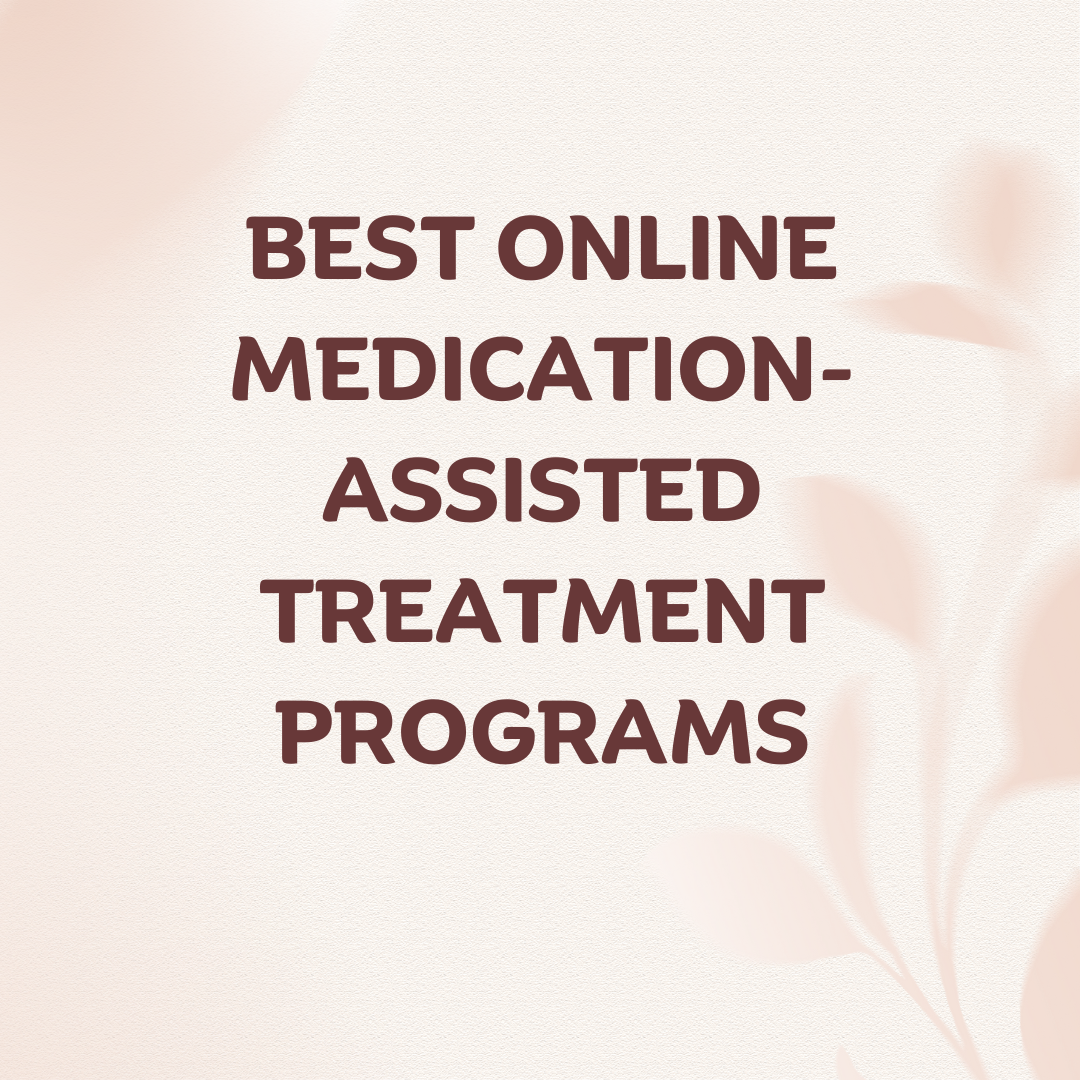
Best Mindful Drinking Apps If you’re thinking about joining the sober curious movement and you’d like to cut back on drinking, mindful drinking apps are a great place to start. Practicing mindful drinking can take some time, attention, and patience, but with the help of the right app, you can completely transform your relationship with alcohol.






